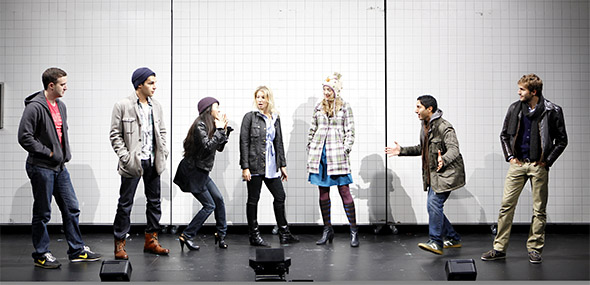THE HUMAN FACTOR
Three questions with MIT playwright Ken Urban
On theater, science, and launching the Playwrights Lab

Ken Urban; photo by Kevin Thomas Garcia
"Understanding others is crucial right now. Of course, understanding is not the same as forgiving or ignoring conflict. But you cannot write convincingly until you care about people who are different from you. That’s what being a playwright has taught me."
— Ken Urban, playwright, director, musician; leader of the MTA Playwriting Program and the Playwrights Lab
Ken Urban, a senior lecturer in MIT’s Music and Theater Arts Program (MTA) is a screenwriter, director, musician, and highly acclaimed playwright, whose work has been performed in New York, London, Boston, and Washington, D.C. He joined the MIT faculty in 2017 and now leads MIT’s playwriting program. Recently, he launched the MTA Playwrights Lab, a groundbreaking collaboration between MIT students and professional theater artists. Urban wrote the screenplay for a feature-film adaptation of The Happy Sad, which screened across the world at 25 film festivals and is now available on iTunes, Hulu, and Amazon.
• • •
Q: You began college studying chemical engineering but instead became a world-class playwright. In what ways does your affinity for math and science inform your writing or your approach to theater-making? More broadly, do you see fruitful connections between the sciences, technology, and the arts?
In terms of how the engineer in me helps my playwriting, it comes down to a question of structure. The thing I loved about studying math and science was how it helped reveal the hidden structure of the universe, and answered questions about how things functioned. When I write a play, I am telling a story and I need to find the best structure to tell that story.
When I was in Catholic grammar school, I loved to diagram sentences. We would take a complex sentence and break it down into the parts of speech, then represent that structure in a compact, orderly diagram. What I loved was how it combined my love of language with my love of problem solving. I do the same thing, in a way, when I write a play. I break down the story into scenes, into beats, trying to figure the best, most exciting way to reveal a character or the plot. That feels to me like the work of an engineer.
The larger connection between theater making, and science and technology is a little trickier. As a playwright invested in psychology, I love the unadorned quality of plays, of actors on a set being in a believable and emotionally-rich scenario. I admire the work of the Wooster Group, Reza Abdoh (I’m helping organize a retrospective of his work here on campus in February), and others in the experimental scene, who use technology as an integral part of their aesthetic. I just don’t tend to create work like that.
Plays about science are especially hard. The amount of material you need to cover for a general audience to understand the science itself can make those plays feel exposition-heavy. That’s never a good thing. It might be why great plays on science are few and far between. But that isn’t stopping me from trying. I am currently working on a new play inspired by Henrietta Lacks and the ethical dilemmas regarding her immortal cells, which are used in labs across the globe.
That play will be workshopped here at MIT at our new theater building W97 in March. The Immortals is a dangerous comedy that uses the science as a springboard for a larger investigation of ethics. I am looking forward to my students seeing how a new play is developed in rehearsal, and no doubt, they will help the actors, the director, and me understand more about biomedical ethics.

The Immortals, Urban's current work-in-progress, will be performed in MIT's W97 Theater
"I am currently working on a new play inspired by Henrietta Lacks and the ethical dilemmas regarding her immortal cells, which are used in labs across the globe. The Immortals is a dangerous comedy that uses the science as a springboard for a larger investigation of ethics."
Q: What have you learned as a playwright and dramatic writer that might help individuals and societies better navigate this complex time in history?
The best writing advice I ever got was from playwright Erik Ehn. He told me you need to feel the breath of your characters on your neck. I took that to mean you need to know them intimately. They cannot be held at a distance. I got that advice at a crucial moment. I was working on Sense of an Ending, a play about the Rwandan genocide, and I was frustrated because I couldn’t understand the two nuns in my play. I was basing these characters on two actual nuns who were convicted of “crimes against humanity” for their perceived role in a church massacre during the 1994 genocide of the Tutsis by the Hutu majority.
But Erik’s advice helped me realize that I couldn’t look at these women from the outside. To make these characters work as dramatic engines, to make the play successful as an evening of theater, I had to understand why Sister Justina and Sister Alice did what they did. To see myself in them. To have empathy or at least understanding why these women did not help.
Understanding others is crucial right now. Remember, of course, that understanding is not the same as forgiving or ignoring conflict. But not to sit in a place of judgment: that is the goal. And that’s what being a playwright has taught me. Not to get too personal, but my father is a climate change denier. It enrages me. But what I have come to understand is that he is motivated by fear. To acknowledge the reality of global climate change is terrifying because it means we have to do something. And it means we are leaving a damaged world to the generations after us. Realizing this facet of my father helped me find ways to challenge him without dismissing him as a person.
I ask my writers here at MIT to read an article about a 43-year-old female steelworker who is asked to train the Mexican workers who are replacing her when the American plant is shut down and the company moves. I chose this article because I know this is an experience far removed from my students’ lives, but I want them to do the hard work of finding themselves inside her experience and use that as a springboard for their new play. You cannot write convincingly until you care about people who are different from you.

Photo: from "The Happy Sad," by Ken Urban; Summer Play Festival, The Public Theater
"In key ways, knowledge has become more and more bifurcated. We have specialties and the solution to contemporary global problems requires a multi-faceted approach. Perhaps teaching students about the collaborations that foster new writing in the theater also helps to catalyze new ideas and models for how collaborations might work in their own fields and areas of expertise."
Q: President Reif has said that the solutions to today’s challenges depend on pairing advanced technical and scientific capabilities with a broad understanding of the world’s political, cultural, and economic facts. What do you view as the main deterrent to such collaborative, multi-disciplinary problem-solving and how can we resolve it?
In key ways, knowledge has become more and more bifurcated. We have specialties and the solution to these global problems requires a multi-faceted approach. One of the joys of a career in the arts is that I am constantly being asked to go outside my comfort zone and to explore subject matter that is beyond my expertise. My Ph.D is in English literature and my dissertation was focused on nihilism and 1990s British theater. I was trained to know a lot about Nietzsche and Sarah Kane. But what do I know about Henrietta Lacks and biomedical research? The Rwandan genocide? Being gay in Uganda?
Writing plays has helped me gain a broader understanding of our world. I don't know how to solve this vast problem [of siloed research], but I do hope that teaching dramatic writing at MIT helps in some small way. Perhaps, teaching students about the collaborations that foster new writing in the theater, also helps to catalyze new ideas and models for how collaborations might work in their own fields and areas of expertise.

Suggested links
MTA Playwrights Lab
MIT Music and Theater Arts
Story: Playwrights Lab gives young writers a professional experience
Under the direction of Ken Urban, the Playwrights Lab provides our students with a chance to workshop scripts with seasoned actors and directors in a professional setting.
Interview prepared by SHASS Communications
Series Editor: Emily Hiestand
Consulting Editor: Elizabeth Karagianis